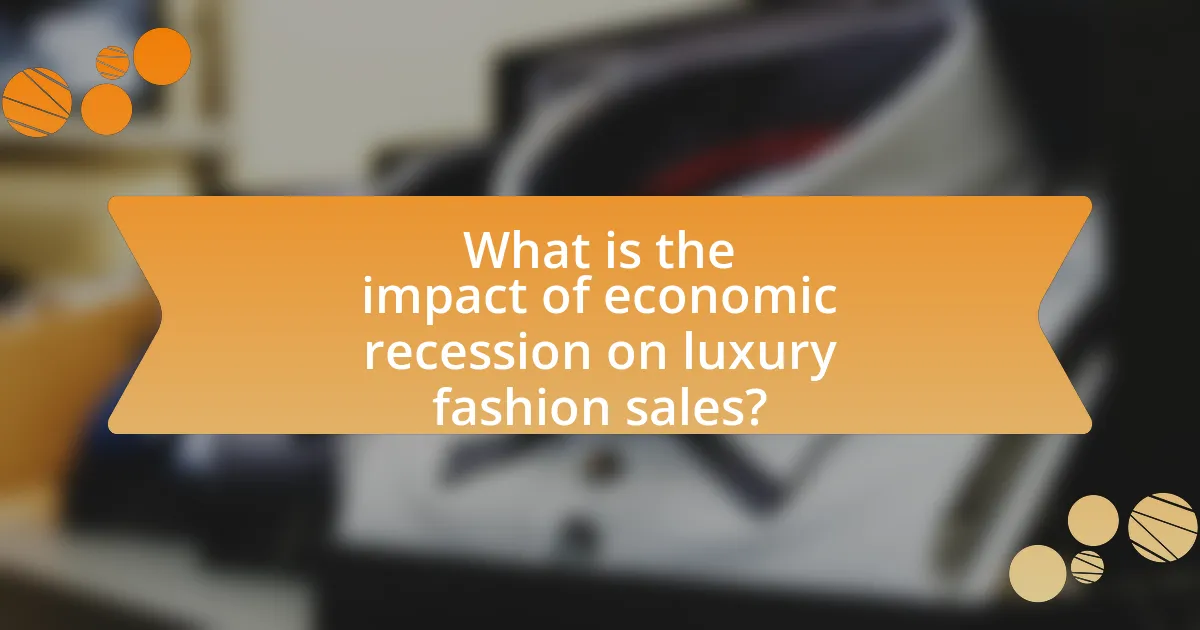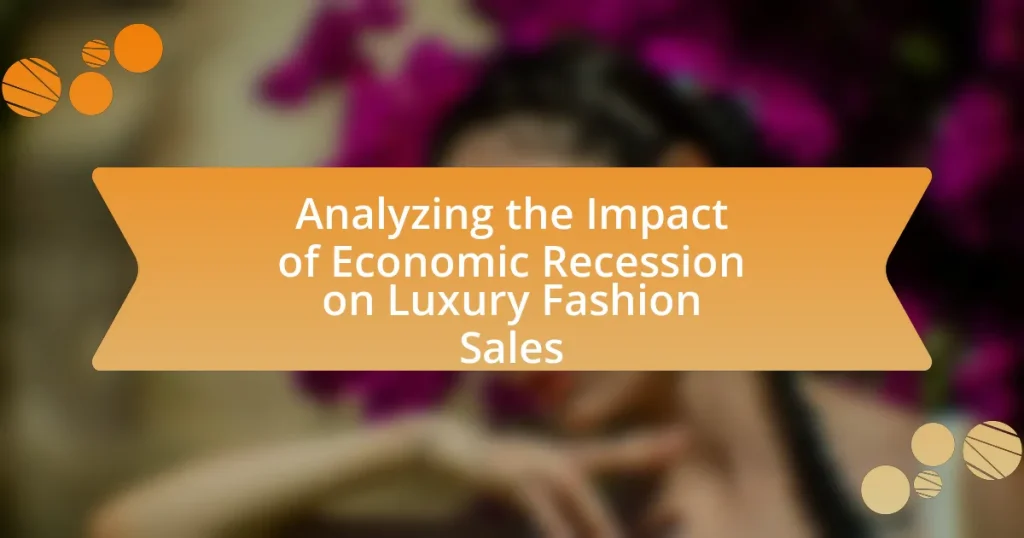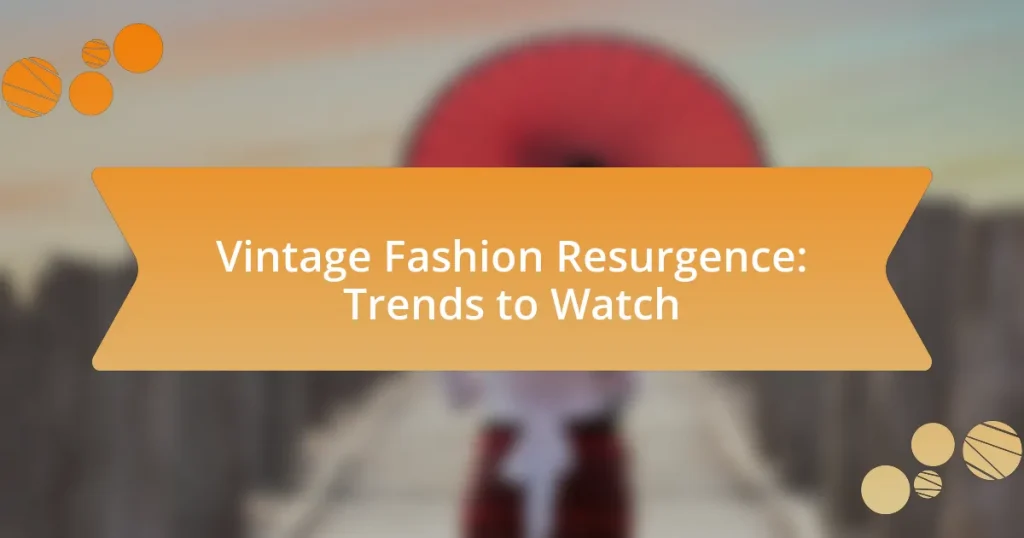The article analyzes the impact of economic recessions on luxury fashion sales, highlighting how downturns lead to decreased consumer spending on high-end goods as individuals prioritize essential purchases. Historical data, including the 2008 financial crisis and the COVID-19 pandemic, illustrates significant declines in luxury sales, with reductions often exceeding 20%. The article also discusses shifts in consumer behavior during recessions, such as increased price sensitivity and a focus on value, as well as strategies luxury brands employ to adapt, including enhanced marketing efforts, product diversification, and improved customer loyalty programs. Additionally, it examines the long-term effects of economic downturns on brand perception and consumer loyalty within the luxury fashion sector.

What is the impact of economic recession on luxury fashion sales?
Economic recessions typically lead to a decline in luxury fashion sales as consumers prioritize essential spending over discretionary purchases. During the 2008 financial crisis, for example, luxury goods sales fell by approximately 10% globally, highlighting the sensitivity of this market segment to economic downturns. Additionally, research from Bain & Company indicates that luxury spending often decreases by 20% or more during significant economic contractions, as affluent consumers become more cautious about their expenditures. This trend underscores the vulnerability of luxury fashion brands to economic fluctuations, as reduced consumer confidence and disposable income directly impact their sales performance.
How does an economic recession affect consumer behavior in luxury fashion?
An economic recession leads to a decline in consumer spending on luxury fashion as individuals prioritize essential goods over discretionary purchases. During recessions, consumers often experience reduced disposable income and heightened financial uncertainty, prompting them to cut back on luxury items. For instance, a study by Bain & Company in 2020 indicated that the global luxury market contracted by 23% due to the COVID-19 pandemic, reflecting a significant shift in consumer behavior towards more cautious spending. Additionally, luxury brands may see a shift in their customer base, with a growing emphasis on value and practicality, as consumers become more selective about their purchases.
What changes occur in spending habits during a recession?
During a recession, consumers typically reduce discretionary spending and prioritize essential purchases. This shift often leads to decreased sales in luxury goods, as individuals become more cautious about their financial commitments. For instance, a study by McKinsey & Company in 2020 indicated that luxury fashion sales dropped by 20-35% globally during economic downturns, reflecting a significant change in consumer behavior. Additionally, consumers may opt for more affordable alternatives or delay purchases, further impacting the luxury fashion market.
How do luxury brands adapt their marketing strategies in response to economic downturns?
Luxury brands adapt their marketing strategies during economic downturns by focusing on exclusivity, enhancing customer experience, and leveraging digital channels. During recessions, these brands often emphasize limited-edition products and personalized services to maintain their allure and justify premium pricing. For instance, brands like Gucci and Louis Vuitton have introduced exclusive collections that cater to affluent consumers seeking unique items, thereby reinforcing their luxury status even in challenging economic times. Additionally, luxury brands invest in digital marketing and e-commerce platforms to reach consumers directly, as seen in the increased online sales reported by brands like Burberry, which saw a 40% rise in digital sales during the COVID-19 pandemic. This shift not only helps maintain sales but also allows brands to engage with consumers through targeted advertising and social media campaigns, ensuring they remain relevant and desirable despite economic pressures.
Why is the luxury fashion market particularly sensitive to economic fluctuations?
The luxury fashion market is particularly sensitive to economic fluctuations because consumer spending on high-end goods is closely tied to disposable income and overall economic confidence. During economic downturns, individuals often prioritize essential purchases over luxury items, leading to a significant decline in sales for luxury brands. For instance, a report by Bain & Company indicated that luxury goods sales fell by 23% in 2020 due to the COVID-19 pandemic, highlighting the market’s vulnerability to economic shifts. Additionally, luxury consumers tend to be more affected by changes in wealth, such as stock market performance, which directly influences their purchasing behavior.
What role does consumer confidence play in luxury fashion sales?
Consumer confidence significantly influences luxury fashion sales, as higher confidence levels correlate with increased spending on non-essential items. When consumers feel secure in their financial situation, they are more likely to invest in luxury goods, which are often viewed as status symbols. For instance, a report by Bain & Company indicates that during periods of economic stability, luxury market growth can reach up to 6% annually, while downturns can lead to declines of 10% or more. This relationship underscores the importance of consumer sentiment in driving demand for luxury fashion, as it directly affects purchasing behavior and market performance.
How do economic indicators influence luxury fashion purchasing decisions?
Economic indicators significantly influence luxury fashion purchasing decisions by affecting consumer confidence and disposable income. When economic indicators such as GDP growth, unemployment rates, and consumer spending are positive, consumers are more likely to spend on luxury items, as evidenced by a 2019 Bain & Company report indicating that luxury goods sales grew by 6% in a strong economic climate. Conversely, during economic downturns, negative indicators lead to decreased consumer confidence and spending, resulting in a decline in luxury fashion sales, as seen during the 2008 financial crisis when luxury sales dropped by 10%. Thus, the state of the economy directly impacts consumer behavior in the luxury fashion market.
What historical examples illustrate the impact of recession on luxury fashion sales?
The 2008 financial crisis significantly impacted luxury fashion sales, leading to a decline in revenue for major brands. For instance, LVMH reported a 10% drop in sales during 2009, reflecting reduced consumer spending on luxury goods. Similarly, Gucci’s parent company, Kering, experienced a 14% decrease in revenue in the same year, highlighting the sensitivity of luxury markets to economic downturns. Another example is the early 1990s recession, where luxury brands like Chanel and Louis Vuitton saw a notable decline in sales, prompting them to adjust pricing strategies and marketing approaches to retain customers. These historical instances demonstrate that economic recessions can lead to substantial decreases in luxury fashion sales, forcing brands to adapt to changing consumer behaviors.
How did the 2008 financial crisis affect luxury fashion brands?
The 2008 financial crisis significantly impacted luxury fashion brands by leading to a decline in consumer spending on high-end goods. As disposable incomes fell and economic uncertainty rose, many consumers prioritized essential purchases over luxury items. For instance, a report by Bain & Company indicated that the global luxury market contracted by 10% in 2009, marking the first decline in over a decade. Additionally, brands like Gucci and Louis Vuitton experienced reduced sales, prompting them to adjust their strategies, including discounting and focusing on emerging markets to recover.
What lessons were learned from past recessions regarding luxury fashion sales?
Luxury fashion sales tend to experience a decline during recessions, but certain segments of the market can remain resilient. Historical data from the 2008 financial crisis shows that while overall luxury sales dropped by approximately 10%, the demand for high-end goods from affluent consumers persisted, indicating that luxury brands can maintain a loyal customer base even in tough economic times. Additionally, brands that focused on exclusivity and personalized experiences were able to weather the downturn better than those that did not. This suggests that maintaining brand prestige and customer engagement is crucial during economic downturns.
How do luxury fashion brands respond to economic recessions?
Luxury fashion brands typically respond to economic recessions by adjusting their pricing strategies, enhancing customer engagement, and focusing on exclusive offerings. During economic downturns, brands often implement price reductions or promotional campaigns to attract cost-conscious consumers while maintaining brand prestige. For instance, during the 2008 financial crisis, brands like Gucci and Louis Vuitton introduced limited-time discounts and special collections to stimulate sales. Additionally, luxury brands may increase their investment in digital marketing and personalized customer experiences to retain loyal clientele and attract new customers. This approach is supported by research indicating that luxury consumers still seek high-quality products even in challenging economic times, as they prioritize value and exclusivity.
What strategies can luxury brands implement to mitigate recession impacts?
Luxury brands can implement targeted marketing strategies, diversify product offerings, and enhance customer loyalty programs to mitigate recession impacts. Targeted marketing allows brands to focus on high-net-worth individuals who are less affected by economic downturns, ensuring that advertising efforts reach consumers with disposable income. Diversifying product offerings, such as introducing lower-priced items or limited-edition collections, can attract a broader customer base while maintaining brand prestige. Enhancing customer loyalty programs encourages repeat purchases and fosters brand allegiance, which is crucial during economic uncertainty. For instance, brands like Gucci and Louis Vuitton have successfully adapted their strategies during past recessions by focusing on exclusive experiences and personalized services, which help maintain consumer interest and spending.
How can luxury brands enhance customer loyalty during economic downturns?
Luxury brands can enhance customer loyalty during economic downturns by focusing on personalized customer experiences and maintaining high-quality service. Personalized experiences, such as tailored communications and exclusive offers, foster a deeper emotional connection with customers, which is crucial during challenging economic times. For instance, brands like Louis Vuitton and Gucci have successfully implemented loyalty programs that reward repeat purchases and offer unique experiences, reinforcing customer commitment. Additionally, maintaining high-quality service, even in a downturn, ensures that customers feel valued and appreciated, which can lead to increased brand loyalty. Research indicates that brands that prioritize customer engagement and satisfaction during economic hardships are more likely to retain loyal customers, as evidenced by a study from Bain & Company showing that emotionally connected customers are more than twice as valuable as highly satisfied customers.
What role does product diversification play in recession resilience?
Product diversification enhances recession resilience by allowing companies to spread risk across multiple revenue streams. During economic downturns, consumer spending typically declines, but a diversified product portfolio can capture varying consumer preferences and needs, mitigating losses in any single category. For instance, luxury fashion brands that offer a range of products, from high-end apparel to accessories and home goods, can maintain sales even when demand for one segment decreases. Historical data shows that companies with diversified offerings often experience less volatility in sales during recessions, as seen in the 2008 financial crisis when brands with broader product lines fared better than those focused solely on luxury apparel.
What are the long-term effects of economic recession on luxury fashion sales?
Economic recessions typically lead to a decline in luxury fashion sales over the long term due to shifts in consumer behavior and spending priorities. During economic downturns, consumers often prioritize essential goods over luxury items, resulting in decreased demand for high-end fashion products. For instance, a study by Bain & Company in 2021 indicated that the global luxury market contracted by 23% in 2020 due to the COVID-19 pandemic, highlighting how economic challenges can significantly impact luxury sales. Additionally, as consumers become more price-sensitive during recessions, luxury brands may face pressure to adjust their pricing strategies, which can dilute brand exclusivity and prestige over time. This shift can lead to a long-term change in brand perception and consumer loyalty, ultimately affecting sales in the luxury fashion sector.
How do recessions reshape consumer perceptions of luxury brands?
Recessions reshape consumer perceptions of luxury brands by shifting their focus from status and exclusivity to value and practicality. During economic downturns, consumers often prioritize essential purchases and become more price-sensitive, leading them to reassess the worth of luxury items. Research indicates that in the wake of the 2008 financial crisis, luxury brands experienced a decline in sales as consumers sought more affordable alternatives, demonstrating a significant change in perception where luxury was no longer synonymous with necessity. This trend is supported by a McKinsey report, which found that 75% of consumers altered their spending habits during economic downturns, favoring brands that offered perceived value over mere prestige.
What trends emerge in luxury fashion post-recession?
Post-recession, luxury fashion trends include a shift towards experiential luxury, sustainability, and digital engagement. Consumers increasingly prioritize experiences over material goods, leading brands to offer exclusive events and personalized services. Additionally, there is a growing demand for sustainable practices, with luxury brands adopting eco-friendly materials and transparent supply chains to appeal to environmentally conscious consumers. Digital engagement has also surged, as brands enhance their online presence through social media and e-commerce platforms, reflecting the changing shopping habits of consumers who seek convenience and accessibility. These trends are supported by market analyses indicating that luxury brands focusing on these areas have seen significant growth in sales and customer loyalty in the years following economic downturns.
What practical strategies can luxury fashion brands adopt during a recession?
Luxury fashion brands can adopt several practical strategies during a recession, including diversifying product offerings, enhancing customer loyalty programs, and focusing on digital marketing. Diversifying product offerings allows brands to cater to a broader audience by introducing more accessible price points or capsule collections, which can attract cost-conscious consumers. Enhancing customer loyalty programs can increase repeat purchases by providing exclusive benefits, thereby retaining existing customers even in tough economic times. Focusing on digital marketing enables brands to reach consumers effectively, as online shopping tends to rise during recessions; for instance, e-commerce sales in the luxury sector grew by 22% in 2020, highlighting the importance of a strong online presence.



